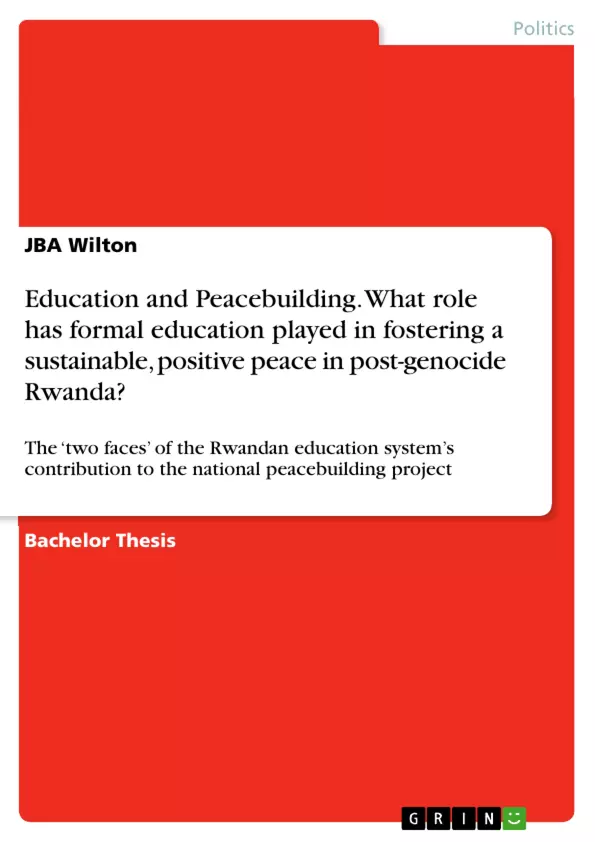This dissertation illustrates the ‘two faces’ of Rwanda’s formal education system in contributing to the creation of a sustainable, positive peace in the post-genocide state. In conveying this argument, it employs the emergent ‘Four Rs Theoretical Framework’ - which is grounded within the foundational Comprehensive Conflict Transformation Model of peacebuilding theory - to undertake a qualitative methodological evaluation of official primary documents and secondary sources.
Through its appraisal of the developments of both the structure and the content of the Rwandan education system since 1994, this paper highlights the mixed record of Rwanda’s formal education system in terms of its contribution to the nation’s wider peacebuilding project. On the one hand, significant progress in all constituent components of the ‘Four Rs’ framework is observable. Policy changes to both its core foundations and its overarching curriculum have promoted elements of redistribution, representation, recognition and reconciliation in Rwanda.
By facilitating the necessary personal, social, cultural and structural transformative processes, therefore, Rwanda’s education system has gone some way in helping to build the infrastructure required for a sustainable, positive peace in the nation. On the other hand, however, this paper also seeks to draw attention to the evidence which suggests that today’s post-genocide schools in Rwanda are in danger of undermining the nation’s initial successes in building peace. The reflection and amplification of inequalities and exclusion throughout the central features of the education system risk constraining and potentially destabilising the nation’s peacebuilding mission.
Inhaltsverzeichnis (Table of Contents)
- INTRODUCTION
- LITERATURE REVIEW
- Historical Background
- The Theory of Peacebuilding
- The Relationship between Education and Peacebuilding
- Methodology - A Qualitative Application of the 'Four Rs Theoretical Framework'
- THE FORM AND STRUCTURE OF RWANDA'S EDUCATION SYSTEM:
- Redistribution
- Recognition
- THE CONTENT AND CURRICULUM OF RWANDA'S EDUCATION SYSTEM:
- Reconciliation
- Representation
- CONCLUSION
Zielsetzung und Themenschwerpunkte (Objectives and Key Themes)
This dissertation critically analyzes the role of formal education in fostering sustainable, positive peace in post-genocide Rwanda. It examines the "two faces" of Rwanda's education system, exploring both its contributions to peacebuilding and its potential to undermine those efforts. The dissertation uses the "Four Rs Theoretical Framework," grounded within the Comprehensive Conflict Transformation Model, to evaluate official documents and secondary sources.
- The impact of formal education on peacebuilding in post-genocide Rwanda.
- The "two faces" of Rwanda's education system – its contributions and potential downsides.
- The "Four Rs Theoretical Framework" (Redistribution, Representation, Recognition, and Reconciliation).
- The role of education in facilitating transformative processes for peacebuilding.
- The potential for educational policies and practices to either ameliorate or aggravate conflict dynamics.
Zusammenfassung der Kapitel (Chapter Summaries)
- Introduction: This chapter sets out the research puzzle, defining "formal education" and "sustainable, positive peace" in the Rwandan context. It establishes the dissertation's core question and its position within existing academic debates regarding the role of education in peacebuilding.
- Literature Review: This chapter reviews the main academic literature on peacebuilding theory, critiquing the United Nations Liberal Model and the Cosmopolitan Conflict Resolution Model. It presents the advantages of the Comprehensive Conflict Transformation Model, which the paper employs. The chapter also evaluates research on the link between education and peacebuilding, highlighting the theoretical inadequacies of the field.
- The Form and Structure of Rwanda's Education System: This chapter analyzes the contributions of the Rwandan education system's form and structure to the processes of Redistribution and Representation.
- The Content and Curriculum of Rwanda's Education System: This chapter examines the effects of the Rwandan education system's content and curriculum on Reconciliation and Recognition.
Schlüsselwörter (Keywords)
This dissertation focuses on the role of formal education in peacebuilding, particularly in the context of post-genocide Rwanda. Key terms include "sustainable, positive peace," "Four Rs Theoretical Framework," "Comprehensive Conflict Transformation Model," "Redistribution," "Representation," "Recognition," "Reconciliation," and "education for peace." The work emphasizes the importance of understanding the complex interplay between educational policies, practices, and conflict dynamics in contributing to peacebuilding processes.
- Quote paper
- JBA Wilton (Author), 2016, Education and Peacebuilding. What role has formal education played in fostering a sustainable, positive peace in post-genocide Rwanda?, Munich, GRIN Verlag, https://www.grin.com/document/335937



